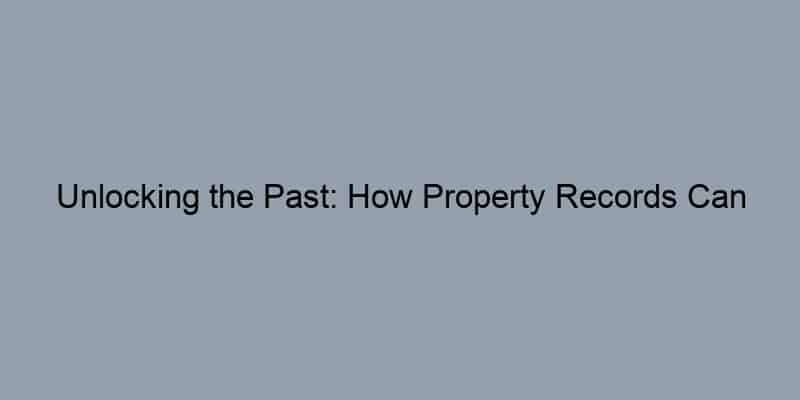Owning a home is more than just having a roof over your head; it’s about understanding the story that your home carries. Every property has a history filled with previous owners, renovations, and even hidden treasures! One of the best ways to unveil this story is through property records. In this article, we will explore why property records are essential, how they can assist home buyers and sellers, and the benefits for realtors, real estate agents, and agencies.
The Importance of Property Records
Property records are public documents that provide detailed information about a property, its ownership, and its history. They include information such as previous sales, property tax assessments, any existing liens or mortgages, and sometimes even the original blueprints of a home.
For home buyers, understanding the property’s history can provide insights into the buying decision. For sellers and realtors, they can present the property’s value effectively.
Why You Need a Comprehensive Property Record
-
Understanding Home Values: Knowing the property’s historical value can give you an idea of how much to offer or list your home for. It allows buyers to negotiate confidently and sellers to price their properties accurately.
-
Sales History: A complete sales history will show how often the property has changed hands and the prices at which it was sold. This information can help assess whether the property is appreciating or depreciating over time.
-
Tax Records: Property tax information is crucial for understanding ongoing costs associated with owning the property. It can also reveal if the owner is behind on taxes, which may be a red flag.
-
Mortgages and Liens: If there are any existing mortgages or liens against the property, you’ll want to know before making a purchase. This information can impact whether you want to invest in the home or not.
-
Owner Information: Knowing about the previous and current owners can tell you a lot about the property’s upkeep and potential issues.
Being informed with comprehensive property records can save you time, money, and potential headaches in the future.
Examples of How Property Records Help
For Home Buyers
Imagine you’re interested in purchasing a home. By obtaining the property record, you find out that the previous owner struggled financially and faced several foreclosures, revealing deep-rooted issues that may have affected the home. You might decide to walk away from the deal, saving yourself from a potentially problematic investment.
For Home Sellers
As a seller, a good understanding of your property’s history helps you showcase its value. Suppose you’ve made significant renovations, like a new roof or updated kitchen. By presenting the records that show these upgrades, you can justify a higher asking price and attract more serious buyers.
For Realtors and Real Estate Agents
Realtors and agents utilize property records to create compelling marketing materials for listings. If they know the average selling price of similar homes in the area and the property’s sales history, they can provide valuable insights to clients, helping them make informed decisions.
For Real Estate Agencies
Agencies can use aggregated property records to identify trends in the market. They can see which areas are appreciating and help guide their clients in choosing strategic investments.
Key Information
- Property Records: Public documents detailing property ownership, history, and assessments.
- Home Buyers: Use them for understanding home values, history, and potential issues.
- Home Sellers: Help in setting proper asking prices and showcasing renovations.
- Realtors/Agents: Leverage records for marketing and guiding clients.
- Agencies: Analyze trends for market strategy.
FAQs About Property Records
1. What are property records?
Property records are documents that provide detailed information about a property, including its history of ownership, sales prices, tax assessments, and any existing liens or mortgages.
2. How can I obtain a property record?
You can obtain a property record from your local county office, or you can visit websites like OfficialPropertyRecords.org for an accessible online option.
3. Are property records public information?
Yes, property records are considered public information, meaning anyone can access them, although the specific process may vary by location.
4. Can property records tell me if there are any liens on the property?
Yes, property records will show any existing liens, which could indicate outstanding debts tied to the property that you would need to address if you decide to purchase.
5. How do property records help in negotiations?
Having access to a property’s sales history and current market data allows buyers to make informed offers, while sellers can justify their asking prices, leading to fair negotiations.
Conclusion
Unlocking the story behind your home doesn’t have to be a mystery. Property records serve as a key resource for understanding your property’s history, assessing its value, and ensuring you’re making educated decisions as a buyer, seller, or real estate professional. We highly recommend obtaining a comprehensive property record from OfficialPropertyRecords.org to ensure you’re equipped with all the necessary information. Invest in the past of your home to secure a brighter future!

